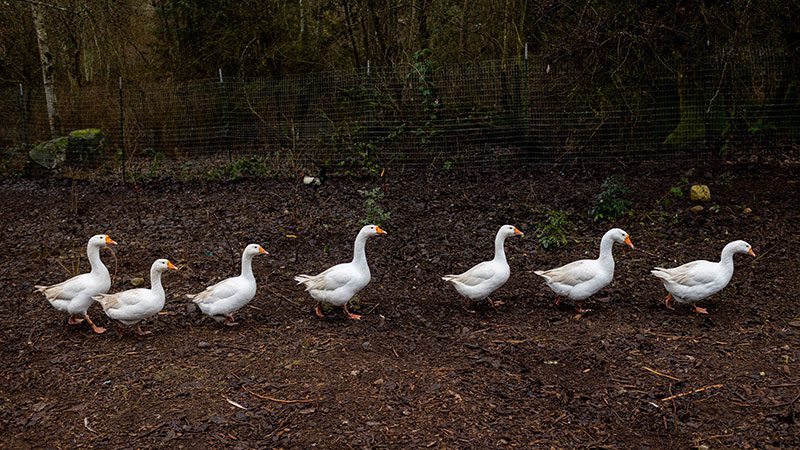[COMMUNITY VOICES]
This article was originally published in March 2023
A conversation with Farmer Frog
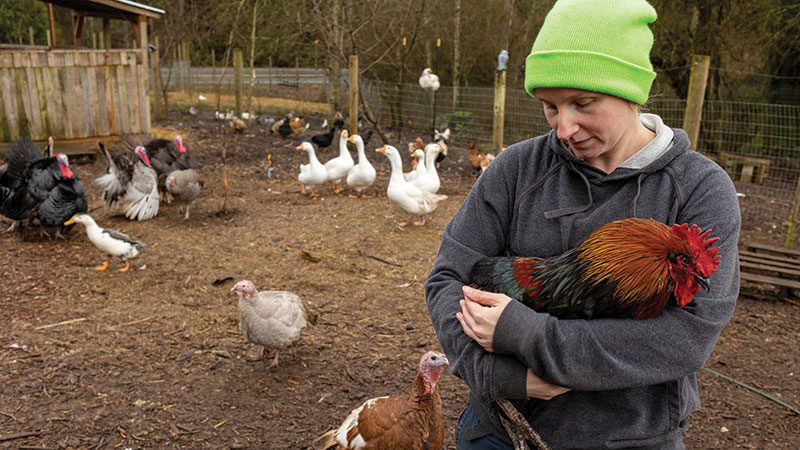
PCC’s mission is to ensure that good food nourishes the communities it serves, while cultivating vibrant, local, organic food systems. We’re proud to partner with organizations throughout the region and share their stories. One is Farmer Frog, which originated with a single school garden and now supports a dizzying array of programs statewide aimed at solving hunger. Sound Consumer contributor Tara Austen Weaver spoke recently with co-founder Zsofia Pasztor about the nonprofit’s work.
Q: How did Farmer Frog get started?
A: In winter of 2009, teachers at our kid’s school in South Everett asked if we could help them build raised beds and grow some produce, because there were a lot of families that lost their homes in the Great Recession and they were camping out in the parking lot. There was this area in the back—you could barely see it because it was covered in blackberries and Scotch broom. I said, “Sure, we’ll feed the community from here.” We started in January of 2010, clearing almost 20,000 pounds of blackberry vines, and by July we were feeding over 700 families.
Then came more requests and more requests—and it was hard, because we had our business, we were doing high-end landscape installations. But we met Will Allen [founder of Growing Power, an acclaimed urban farming program in Wisconsin] and I ended up training with him for six months in 2013. He told us to become a nonprofit, so Farmer Frog was born. Frogs are sentimental to our family, but they are also the canary in the coal mine. So, it reflects on our food growing and environmental stewardship ethics.
Q: How has the program evolved from those first gardens?
A: Over the years, we realized that teachers need a lot of support for food gardens. The U.S. has always grown our own food—all of the tribal nations cultivated their own food before colonization, and a lot of the colonizers were farmers as well. But our society is losing that knowledge and understanding. We can build a school garden, but it won’t be used unless the teachers feel comfortable using that space. So, we started a program for teachers (offering) externships and STEM continuing education. Before COVID we were supporting about 25,000 families in several dozen schools.
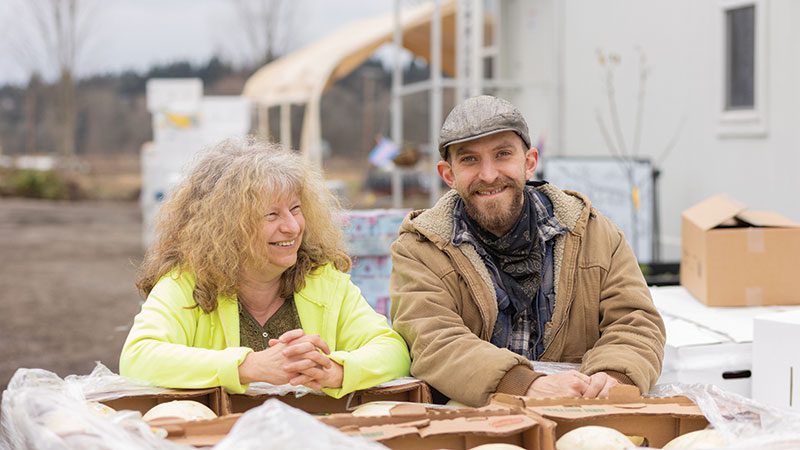
Q: How has the pandemic impacted Farmer Frog?
A: In March (2020), when everything shut down, we started getting calls from our volunteers. Everyone was in isolation, but our volunteers knew what was growing in the gardens and asked if they could receive some of those vegetables. So, we started harvesting out of the farm we have in Woodinville and at the school sites that were accessible. Out of that came a delivery project that is still going on today, for folks who are in isolation and otherwise need support, and it’s absolutely free. We normally go through 150-200 boxes a week. These became lifelines for the families who are in isolation due to some really hard health situations.
(Later) we got a call from people who were going out to Othello to get some potatoes and wanted to know if we could loan them some of our farm crates—this was 2020 and the farmers couldn’t move the produce. We got in just shy of 20,000 pounds of potatoes and onions and within a few hours they had all found homes. The next week I asked for more, and before you know it, we were going through millions of pounds of produce.
Another nonprofit, EastWest Food Rescue, was born out of the effort as well. Farmer Frog and our sister nonprofit, the National Tribal Emergency Management Council, have moved over 160 million pounds of food and supplies since then. Over the years we’ve become sister organizations and now we support about 3 million people in 36 states.
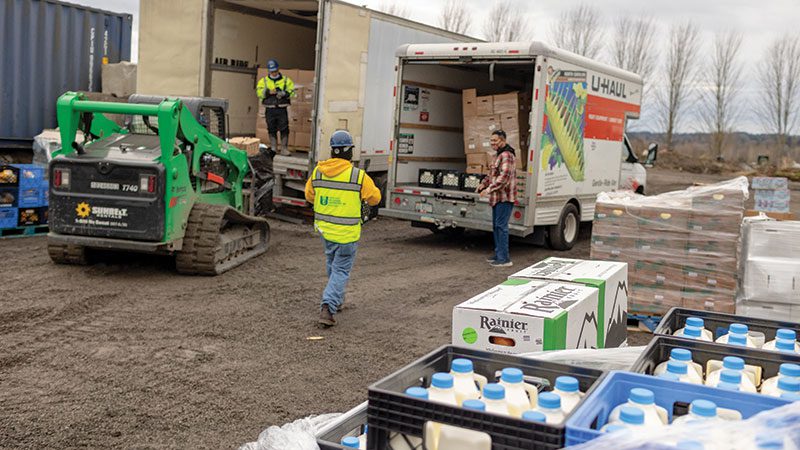
Q: How has that changed your mission or how you operate?
A: We are doing our best to support every community with food that is appropriate for that community. We’ve learned a lot, but our goal is to have a fresh food economy that really helps and solves hunger in the long run.
Unfortunately, the USDA stopped doing food boxes in 2021 [USDA authorized free food boxes from May 2020 to April 2021, as a way to support families in need and farmers who had lost markets due to pandemic shutdowns]. Here in Washington, the Washington State Department of Agriculture picked it up and there is the We Feed WA program that is now running.
We are one of the contractors under the We Feed WA program, but there is not enough funding and the need is growing. We see new organizations coming in every week at our distribution facility in Snohomish. And the organizations that normally pick up for 300 people now need food for 500. These are not small jumps.
Q: How has the organization grown as you’ve been doing this work?
A: We are a team of 35 people now; we have an admin department that tracks and accounts for everything. We have our distribution team and our farm team growing a lot of food, and we partner with a lot of other farmers and food processing companies and facilities. And we’re funded by grants and donations and our contract with We Feed WA.
We don’t have a warehouse; we operate out of three refrigerated trailers. We go through 200,000-300,000 pounds of food every week, and there is not a speck of it left over. Our food comes from all different sources: We buy food, we glean food, we grow food, we rescue food, we get donations. We have a seven-acre permaculture farm in Woodinville and we grow food there, and we have a little bit of livestock too.
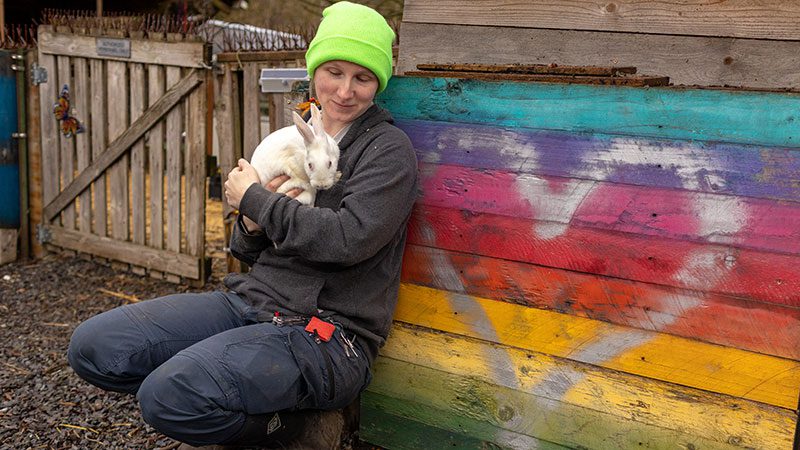
Q: What have you learned from the past few years of addressing food needs?
A: We really do need all of us in this together. We are not going solve hunger unless we provide food sovereignty. And that has to do with the community and supporting their solutions, instead of dictating what their choices are. Food support and pre-made food boxes are really important now, but they will only help with today—and people will be back next week and this will never end.
We need livable wages, and we need culturally relevant food that people want to eat. We have so many grant applications that ask: “How are you going to make your program sustainable?” But I don’t want to make food assistance sustainable. I want to make it unnecessary!
Q: How can people get involved in supporting the work you’re doing?
A: We are always looking for more drivers on our Saturday delivery routes. People drive their own vehicles and can get anywhere from three to 26 boxes to deliver, depending on what they want. People who grow food and have excess can bring it in—from fruit trees, for example. And in summer and early fall, people can help us harvest. Obviously, we always take donations through our website. Every little bit matters. For more information see farmerfrog.org.
